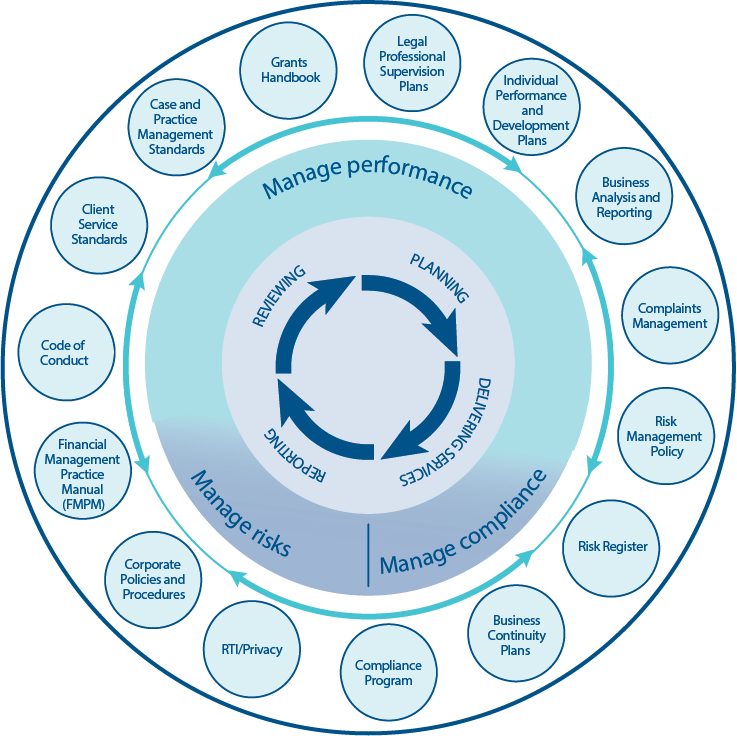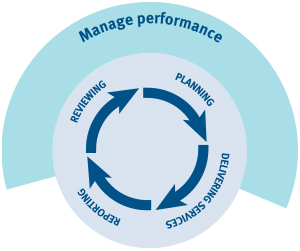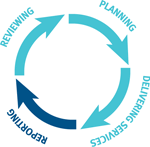Governance framework
The Financial and Performance Management Standard 2019 – S7 requires that statutory bodies have an appropriate governance framework.
Legal Aid Queensland's governance framework demonstrates the strategies, policies and processes that ensure effectiveness in managing performance, managing risk, and managing compliance.

Managing performance

The strategic management cycle guides how we manage our performance. It consists of four stages:
- planning
- delivering services
- reporting
- reviewing.
Planning

We are accountable to the federal and state governments for providing legal assistance services to financially disadvantaged Queenslanders. These services are specified in the National Partnership Agreement on Legal Assistance Services and the Queensland Government’s annual service delivery statements.
Effective planning is important to ensure Legal Aid Queensland (LAQ) remains on track to achieve the results required by government and to maximise the value of services to clients and stakeholders.
The strategic, operational and business plans guide actions and methods of evaluation for all LAQ operations. These plans demonstrate the links between the federal and state governments’ legal aid priorities, how those priorities are translated into products and services and how those activities are monitored to ensure the best value for money and the best outcomes for clients and stakeholders.
The objectives and performance measures in the strategic and operational plans guide the performance plan of the chief executive officer and subsequently the performance plan of all other staff members.
Strategic planning
Our strategic planning process looks at:
- our past performance, and how future performance might be improved
- issues emerging in the internal and external environments that may influence the future
- what objectives we might realistically aim for during the planning period, including how services and efficiency might be improved
- how those objectives will be achieved, including the resources required
- how success will be measured and reported
- the risks involved and how we will deal with them.
The strategic plan outlines the objectives and strategies for a four year period. It also shows the key performance indicators that will be used to monitor if these objectives are achieved.
Our role
To provide legal assistance to financially disadvantaged people throughout Queensland as a valued part of the legal and justice system.
Our purpose
To maintain the rule of law, protect legal rights, contribute to the fairness and efficiency of the justice system, and reduce the social impacts of legal problems.
Our vision
To be a leader in a fair justice system where people can understand and protect their legal and human rights.
Our values
Social Justice
We seek to protect people’s legal and human rights, promote dignity and fair treatment and help those at risk of social exclusion.
Respect
We respect the people we assist, those with whom we work and their safety, and the rule of law, our professional obligations and the administration of justice.
Quality
We strive to improve the quality of our work and the outcomes for our clients.
Cost effectiveness
We deliver innovative, sustainable, quality and cost effective services.
Accountability
We are accountable to our clients, courts, the legal profession, the community and those who fund us.
Our services
Community legal education and information
Through our website, publications, community legal education activities, statewide contact centre and customer service counters.
Legal advice and task assistance
Over the phone, by video-link, or face-to-face.
Duty lawyer services
In criminal, family, domestic violence, child protection, anti-discrimination, employment and administrative law.
Lawyer assisted dispute resolution
For families facing separation, and for consumers and farmers.
Representation in courts and tribunals
Including criminal law, family law, child protection, domestic violence, mental health and some civil law matters.
Our environment — risks and opportunities
- Ability to meet the challenges of providing a broad spectrum of services to a diverse range of clients across a geographically decentralised state and including in a constrained fiscal environment.
- Capacity to continue to invest in our people, other service providers and systems while meeting demand for services.
- Key opportunity from increased state recurrent and nonrecurrent funding to improve access to justice by financially disadvantaged Queenslanders.
Our objectives will be delivered through the following strategies:
Legal Aid Queensland’s strategic objectives are determined by the Legal Aid Queensland Act 1997 (Qld). We are also committed to the principles of the National Legal Assistance Partnership 2020–25. Legal Aid Queensland also contributes to the Queensland Government’s community objective of backing our frontline services.
Objectives
Objective 1
Provide quality and cost effective legal services to our clients
Objective 2
Progress our vision through collaboration and policy leadership
Objective 3
Build on our business capability, sustainability and workplace culture
Objective 4
Contribute to the administration of justice
Strategies
- Support early resolution of legal problems
- Ensure we capably respond to people most at risk of social exclusion including Aboriginal and Torres Strait Islander people
- Build centres of excellence in our fields of legal practice
- Partner with private lawyers and community legal centres to help ensure quality services
- Innovate to maximise the reach of services to rural and regional communities
- Lead policy on issues affecting our service delivery
- Engage collaboratively with service providers
- Maintain a well, safe, skilled and engaged workforce
- Maintain a safe workplace
- Maintain our focus on financial sustainability and accountability
- Improve business support systems and infrastructure
- Contribute to the fair and efficient administration of justice
Performance indicators
- Meeting National Legal Assistance Partnership performance indicators ($)
- Meeting Queensland Government service delivery statement measures (% and av cost)
- Results of quality and compliance audits
- A mean satisfaction score > 7 in client satisfaction survey
- Delivering internal and external training opportunities to staff and other service providers
- Achieving First Nations Strategic Plan objectives
- Improving services to rural and regional communities
- Participating in legal assistance forums
- Contributing to government policy development
- Implementing service delivery initiatives in the:
- Financial Strategy
- Strategic Workforce Plan
- ICT Strategic Plan
- First Nations Action Plan
Operational planning
Operational plans form the second stage of planning and demonstrate how the strategic plan is put into action as well as providing specifics about services and service standards.
Each division is responsible for a number of key operational results to ensure that the strategic plan objectives are achieved. The operational plans list these results and the performance measures to show whether a satisfactory level is achieved. LAQ’s operational plan performance measures focus on four key result areas: efficiency, outputs, people and quality.
Budget development
LAQ has an annual budget cycle for financial allocation, monitoring and reporting purposes.
Delivering services
Delivering quality in-house legal services

LAQ uses a range of integrated strategies to achieve high quality service delivery across all services.
The Quality Legal Services Framework applies to all lawyers employed by LAQ. It outlines the lawyers’ responsibilities under the Legal Aid Queensland Act 1997, and describes the elements of the framework that assist in ensuring high quality service.
These are:
- merit based recruitment and selection
- induction
- continuing professional development
- case management standards, practice management standards, client service standards and service charter
- legal professional supervision and support
- file reviews
- complaints management
- client satisfaction survey
- annual quality workshops.
Delivering quality services contracted from preferred suppliers
LAQ have contractual arrangements with nearly 300 private practitioners to ensure demands for legal services are met across the whole of the state. The requirements for inclusion on our preferred supplier panels include:
- meeting inclusion criteria relevant to the type of service to be provided
- entering into a service agreement that requires compliance with the Legal Aid Queensland Act 1997, relevant professional rules, LAQ practice and case management standards, and establishes the payment and operating rules
- making files available for regular audit by the LAQ audit team.
Capturing service delivery data
Service delivery data is captured in various LAQ business systems and time recording. Our business analysts monitor performance data in all services, work units, and regional locations. Output targets are negotiated annually with work units in order to achieve the overall service targets set by the National Partnership Agreement and Service Delivery Statements.
Business systems for efficient service delivery
LAQ has a range of business systems and policies and procedures to support efficient and transparent conduct of business. The grants handbook also provides a reference point for decision making.
Reporting

LAQ has a number of routine reporting obligations to internal and external stakeholders based on key performance indicators and service standards.
External reporting
External reporting includes:
- National Partnership Agreement: a six-monthly report to the federal government via the Queensland Government Department of Justice.
- Service Delivery Statements: an annual overview of achievements, future developments and projected performance outcomes to the state government including financial statements.
- Estimates committee: preparation of material for state government Estimates Committee hearings on a range of topics and issues relating to our service delivery.
- Annual Report: an annual summary of LAQ performance outcomes against strategic plan objectives, and includes audited financial statements
- CEO Attestation of information security risk: 2023-24(PDF, 55KB), 2022-23(PDF, 53KB), 2021-22(PDF, 347KB), 2020-21(PDF, 69KB), 2019-20(PDF, 59KB) and 2018-19(PDF, 47KB).
Internal reporting
Internal reporting includes:
- Board Performance report: A monthly report to the LAQ Board via the Executive Leadership Team. This report outlines progress and performance in relation to service delivery outputs, financial performance, human resources and risks.
- Executive Leadership Team report: A monthly operational performance report for LAQ’s Executive Leadership Team.
- Division/team reports: Monthly operational performance reports for LAQ’s divisions and teams.
Reviewing

Internal and external environmental scanning conducted annually as part of our planning processes helps to identify opportunities for improvement and pinpoint the areas that may require a more comprehensive review. Progress of organisational reviews and business improvement projects allocated during the planning process are continually monitored by the Executive Leadership Team and the Senior Leaders Group.
Feedback from clients and stakeholders
Ongoing communication with service providers and community stakeholders provides clear feedback on the service provided by LAQ as well as identifying any emerging issues.
As part of this feedback process LAQ administers a client survey every two years. This survey provides insight into the services provided from a client perspective and highlights current strengths and possible areas of improvement.
LAQ convenes regional legal assistance forums throughout the state, which allow service providers and other stakeholders to:
- discuss emerging legal needs in communities
- work collaboratively to solve problems
- prevent duplication
- address service delivery gaps.
Information gathered at the regional forums is collated into an annual legal services scan, and contributes to discussions at Queensland Legal Assistance Forum meetings.
Complaints
Responding to complaints about service delivery is an important part of providing good customer service. Adhering to the complaints management policy and procedure allows issues to be resolved quickly while also identifying business improvement opportunities.
Managing risk
The Audit, Risk and Compliance Committee is a sub-committee of the Legal Aid Queensland Board and meets four times each year.
The role of the committee is to provide ongoing assurance in areas of:
- financial administration and reporting
- audit control and independence
- legislative compliance
- internal controls
- risk oversight and management.
Reviewing and updating LAQ’s risk register is a key element of the annual planning process. Risk management is a continually discussed at the Executive Management Team and Audit, Risk and Compliance Committee meetings.
Instrument of delegation
In our instrument of delegation the chief executive officer assigns authority to designated officers to carry out actions, sign documents, or approve financial transactions on his behalf. Delegations are set at levels taking account of associated risks.
Managing financial risks
The Financial Accountability Act 2009 and the Financial and Performance Management Standard 2019 provide the legislative framework for our Financial Management Practice Manual, which documents the financial policy standards we need to meet to ensure financial accountability and manage financial risks.
Business continuity planning
Business continuity planning is a critical component of risk management in LAQ and allows the preparation for a range of likely events that could disrupt our services. Business continuity planning covers all of the activities that need to be directed and coordinated during and after an event or service disruption. This includes:
- managing the emergency response when an event occurs
- managing through a crisis situation
- managing business recovery, including the re-establishment of core services as soon as possible following a business interruption.
Emergency response
Our emergency response plans and procedures guide our activities in a range of emergency situations, including fire, emergency evacuation, and bomb threat.
Crisis management
Crisis management plans outline what will be done at each stage of a crisis situation and who will be responsible.
Business recovery
The last phase, returning the business and services to normality requires an organised and well communicated strategy.
Managing compliance
One of the key responsibilities of the Audit, Risk and Compliance Committee is to:
Establish a sound system of compliance with laws and regulations, internal compliance guidelines, policies, procedures and control systems and prescribed internal standards of behaviour. (Audit, Risk and Compliance Committee Charter)
Reporting to the Executive Management Team and the Audit, Risk and Compliance Committee, our compliance program provides a framework that assists in achieving this responsibility. It involves:
- identifying the legislation and guidelines applicable to our activities
- identifying where we are at risk of breaching these requirements
- putting in place a regular compliance audit to prevent such breaches and the risks associated with them
- educating and changing behaviour through awareness and training activities.
Last updated 9 January 2023